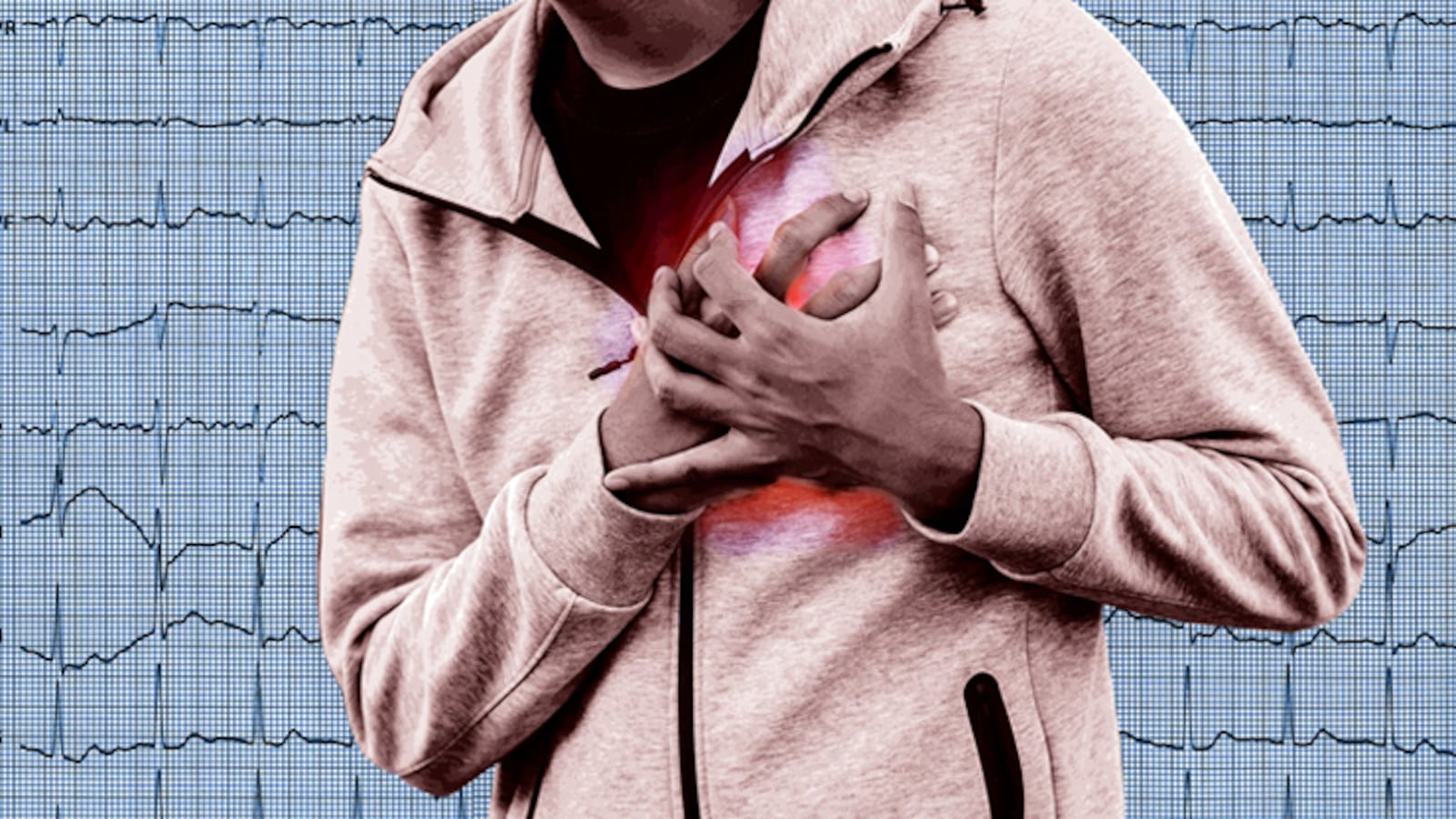Amy Josar never had trouble picking up her dog. After all, Recey, the Jack Russell-pug mix, weighed only 17 pounds. But one night in the summer of 2016, Josar just couldn’t do it. She hadn’t been feeling well for a few days, with a handful of symptoms—chest pressure she attributed to the summer’s heat, plus diarrhea, indigestion, intense sweats—that made her wonder whether she had a virus.
But it wasn’t a virus. It was a heart attack. Josar was only 37 years old.
“We have heart disease in our family, but it’s a generation removed and it affected people much older,” Josar told The Daily Beast. “I was just, like, ‘How did this happen?’”
Josar is one of about 735,000 Americans who have a heart attack every year, according to the Centers for Disease Control and Prevention. But her younger age, healthy diet, exercise plan, and lack of smoking history seemed at odds with her heart attack. If anything, her health markers showed no signs of having poor cardiovascular health: older in age, maybe with a poor diet or an obesity diagnosis, maybe someone who smoked cigarettes all their life.
But the reality is that heart disease does not discriminate: It can affect anyone. Rather, the root of the heart disease might be harder to find. Josar’s heart attack was caused by a near-fatal marriage of a blood clot—which doctors think was caused by her birth control—and Sjogren’s syndrome, an immune disorder that can increase the risk of heart attack.
John Osborne, M.D., Ph.D., a cardiologist who focuses on preventative cardiology and volunteers with the American Heart Association, says that heart disease is typically caused by risk factors that he calls The Big Four: diabetes, tobacco use, high blood pressure and cholesterol. But it’s important to remember that these aren’t the only risk factors and that poor cardiovascular health can affect even the (seemingly) healthiest of people.
In February 2017, celebrity fitness trainer Bob Harper, known for coaching individuals through weight loss on NBC’S The Biggest Loser, suffered a heart attack and went into cardiac arrest in a gym in Manhattan.
Harper, now 52, told The Daily Beast that he doesn’t remember anything from the day of his heart attack, but that he’d reported entering the gym feeling dizzy. Next thing he knew, he was waking up from a two-day coma in the hospital.
“I was super confused. I didn’t know what was going on and when they told me what had happened, I couldn’t believe it,” he said. “I was embarrassed and I was just blown away. How did I have a heart attack?”
Harper’s attack was caused by an increased level of what’s known as lp(a), or lipoprotein(a), a cholesterol level that can increase the risk of heart attack. Having a high level of this cholesterol, Osborne said, is particularly sneaky in that it doesn’t show up on a regular cholesterol screening ordered by your doctor. In other words, you have to know to ask for it.
The problem is that many people, especially young people and those who are ostensibly in good health, aren’t getting screened for these kinds of abnormalities either because they don’t feel concerned for their cardiovascular health or because their doctor doesn’t think they need to be tested.
“Heart disease kills more than 800,000 people a year, and of those 800,000 people, 160,000 people happen to be below the age of 65, so it’s not just an elderly person’s disease,” said Osborne.
Many of the preventative measures can seem fairly rudimentary, Osborne acknowledges, but they’re still aggressively important. First up is knowing your family history, and not just for straightforward heart disease but also for strokes, diabetes and cholesterol levels. Ask your immediate and extended family for their medical history, too, as it could tip your doctors off to test you for various things they might’ve otherwise not tested you for.
Osborne also recommended other very basic but critical preventative care: Exercise at least 30 minutes every day and eat a healthy diet high in plant-based foods and low in red meat (a 2017 study found a connection between red meat and mortality linked to cardiovascular disease, cancer, respiratory disease, stroke, diabetes, infections, kidney disease and liver disease).
As far as cholesterol and blood pressure go, start paying attention to it in your twenties, Osborne said. Get your cholesterol tested every five years and ask your doctor questions about what your results mean and how you may need to change your diet and lifestyle if they’re less than satisfactory. As far as blood pressure goes, be aware of it when you go to the doctor. High blood pressure is defined as 130/80 by the American College of Cardiology, which also says that the prevalence of high blood pressure is increasing so much that it’s expected to triple in men under the age of 35 and double in women of the same age.
Something else to stay away from? Any kind of smoking, including e-cigarettes, which have been linked to arterial stiffness, higher blood pressure and an increased heart rate.
“There is no safe amount of tobacco use, period,” Osborne said. “I tell people who say ‘I smoke socially and I vape,’ it’s kind of like saying, ‘Tell me how much cyanide I can use safely.’”
If you do everything you can to prevent a heart attack and you still get one, there’s hope.
Kara Spurling, who was 39 when she had a heart attack, found help through Facebook groups like Women Heart, The National Coalition for Women with Heart Disease. And Harper joined forces with AstraZeneca, a bio-pharmaceutical company, for a Survivors Have Heart campaign that encourages survivors to take more action to prevent another heart attack.
“For most people who have a heart attack, they think it’s the end of their life when they have it,” Harper said. “But it’s probably the beginning of a better life for them when they follow and listen to their doctors.”





